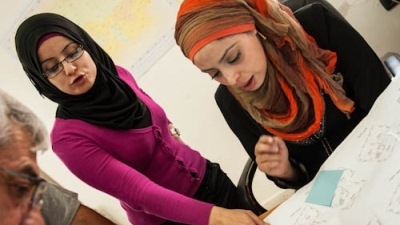Challenge
Charitable organizations had emerged in West Bank and Gaza (WB&G) at the turn of the 20th century and since the 1960s, have provided a variety of essential social services, including health, agriculture, mental health, education, environment and services for people with special needs and so on, in the absence of a state. Nongovernmental organizations (NGOs)/community-based organizations (CBOs) filled an important service delivery gap, both regarding coverage and funding: (1) in geographical areas where the Palestinian Authority (PA) cannot provide services, and (2) at a time when donor assistance, aimed at easing the PA’s unprecedented fiscal crisis, was not directly channeled to services provided by NGOs/CBOs. However, there are instances of duplication of efforts, suboptimal service quality and/or suboptimal citizen access to services, lack of coherent policy directions, lack of access by the PA to marginalized geographical areas, or for certain geographical areas there is lack of service provision by both, the PA or NGOs/CBOs. In addition, to increase efficiency in service delivery, NGOs/CBOs needed to improve their governance practices and enhance coordination with the public sector and other stakeholders.
Solution
The Third Palestinian NGO Project (PNGO III) provided grants, selected on a competitive and transparent basis, to its direct beneficiaries, that is: NGOs/CBOs that were closest to the poor and marginalized to support the provision of social services to the indirect project beneficiaries: poor, under-served or marginalized Palestinians due to geographic location (for example, barrier wall, Gaza, East Jerusalem), and/or their social/physical limitations (for example, women, youth, disabled). Secondly, the PNGO III supported the NGO sector to become more responsive, transparent, and accountable by providing capacity building, and setting standards, for example, producing an NGO Code of Conduct. This code is the first of its kind in the Middle East and North Africa (MNA) region and was adopted by the Arab League. Project implementation was innovative, for example: Bank supervision through video conferencing between the two fully equipped offices of the NGO Development Center (West Bank, Gaza) during the closure of Gaza, also, NDC’s Gaza staff adapted work schedules to work around power shortages or joined field visits with other staff during fuel shortages.
Results
As NGO/CBO sub-projects were prepared with full community participation (via transparent selection, participatory planning/needs assessments, community scorecards), and effectively reached the most vulnerable and marginalized population groups, the Bank’s approach to support social service provision through registered NGOs proved to be valid and complemented similar PA efforts, especially in areas where the PA cannot provide services (East Jerusalem, Gaza, marginalized West Bank areas). Given the political and security situation in WB&G, continuation of the program is essential for (i) service provision through civil society, and (ii) maintaining results in preserving human and social capital, and improving NGO quality with Bank support.
Key outcomes, measured between the project start in 2006 and project end in 2011:
- More than 268,538 people benefitted from the NGO grants, and in the process, 143,300 man/days of work were generated. Additionally, 88 percent of beneficiaries in West Bank and 100 percent in Gaza were from targeted geographic areas; 75 percent of beneficiaries were from targeted vulnerable groups (target 50 percent).
- Improved quality and sustainability of social service delivery by NGOs that were supported by the project. Particularly, there was an increase in the number of NGOs implementing good governance (4 to 31 percent), accountability (8 to 50 percent) and transparency (6 to 54 percent) defined in the NGOs’ Code of Conduct and as measured by the Organizational Capacity Assessment Tool.
- Sixty percent of staff of NGOs supported by the project have been trained on the Code of Conduct and these NGOs publicly disclose their financial statements. The code has provisions related to transparency, participation and accountability to improve the governance of NGO operations, including the quality of service delivery to Palestinians, and their upward accountability to the PA and downward accountability to citizens.
- Seventy percent of NGOs improved their financial and administrative procedures (target 50 percent).
- Ninety-three percent of NGOs receiving support from the NDC rate its services satisfactory.
Bank Group Contribution
Two grants for a total of US$12.93 million were made available through the Trust Fund for Gaza and the West Bank (TFGWB).
Partners
The Agence Française de développement (French Agency for Development, AFD) provided financing in the amount of US$7.6 million.
Moving Forward
Results are maintained through the fourth Palestinian NGO Project (PNGO IV). The request for a successor project further proves the continued relevance of project benefits and project design offered by this type of project. Additionally, a related fiscal year 2012 economic and sector work (ESW) on State-NGO relations shows the interest in strengthening partnerships in social service delivery by public and civil society entities.
Beneficiaries
World Bank and donor-supported grants have helped local NGOs and CBOs provide essential social services to Palestinians, thus making a significant difference in their quality of life. The project also supported the establishment of the NGO Development Center (NDC), with the mandate to promote the development of a responsive and accountable Palestinian civil society. This umbrella organization provides technical assistance and mobilizes grant making resources for NGOs and CBOs, serving as an effective mechanism for channeling funds to NGOs and helping to develop the NGO sector.
